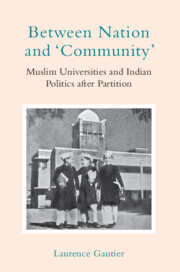Book contents
- Frontmatter
- Dedication
- Contents
- List of figures
- List of tables
- Acknowledgements
- A note on transliteration and translation
- List of abbreviations
- Introduction
- 1 A laboratory for composite India: Jamia Millia Islamia around the time of partition
- 2 Sifting Sir Syed’s legacy: From the ‘arsenal of Muslim India’ to a symbol of India’s national integration?
- 3 Re-legitimising minority rights: The campaign for Aligarh Muslim University’s minority status
- 4 Resisting minority politics, holding on to composite nationalism: Jamia Millia Islamia in the post-Nehruvian period
- 5 Uplifting backward Muslims: The new consensus?
- 6 Bastions of Islam: The defence of Islam as a narrative of empowerment and contestation
- 7 Women in Muslim universities: Guardians of tradition or actors of change?
- Conclusion
- Appendix
- Glossary
- Bibliography
- Index
Introduction
Published online by Cambridge University Press: 15 April 2024
- Frontmatter
- Dedication
- Contents
- List of figures
- List of tables
- Acknowledgements
- A note on transliteration and translation
- List of abbreviations
- Introduction
- 1 A laboratory for composite India: Jamia Millia Islamia around the time of partition
- 2 Sifting Sir Syed’s legacy: From the ‘arsenal of Muslim India’ to a symbol of India’s national integration?
- 3 Re-legitimising minority rights: The campaign for Aligarh Muslim University’s minority status
- 4 Resisting minority politics, holding on to composite nationalism: Jamia Millia Islamia in the post-Nehruvian period
- 5 Uplifting backward Muslims: The new consensus?
- 6 Bastions of Islam: The defence of Islam as a narrative of empowerment and contestation
- 7 Women in Muslim universities: Guardians of tradition or actors of change?
- Conclusion
- Appendix
- Glossary
- Bibliography
- Index
Summary
Can a Muslim university be an Indian university? In his landmark article ‘Can a Muslim Be an Indian?’ Gyanendra Pandey draws a revealing comparison between two common expressions—Hindu nationalists and nationalist Muslims. While Hindus are considered to be ‘natural’ Indians, who are nationalist by default—Hindu nationalism being one brand of nationalism— Indian Muslims are taken to be primarily Muslims, whatever their political stance may be. Unlike Hindus, their commitment to the nation cannot be taken for granted; it has to be proven, for their Muslimness casts doubt on their Indianness.
Similar apprehensions affect Muslim institutions, including universities. By Muslim universities, I refer to institutions established by Muslim individuals or organisations, primarily—though not exclusively—for Muslim students. Unlike madrasas, these universities offer mostly non-religious education along the same lines as other non-Muslim universities. Therefore, their ‘Muslim’ character rests on their foundation's history and on their Muslim-majority population, much more than on their educational programmes. Visible Islamic symbols, such as mosques or tombs, may act as reminders of this character; so too can students, teachers and administrators’ frequent allusions to the need to preserve and promote ‘Muslim culture’. However, there is no consensus on either the interpretation of ‘Muslim culture’ among university members or how and to what extent it should frame life on campus.
For many external observers, there seems to be a fundamental tension between these universities’ Muslim character and their capacity, or even their willingness to serve the nation. These apprehensions, inherited from partition, surfaced again recently during the debates around the Citizenship Amendment Act (CAA). In December 2019, a wave of protests broke out across India when the parliament adopted this Act, which introduced, for the first time, a religious criterion in the rules of access to Indian citizenship. On 15 December, amidst growing student mobilisation, police forces stormed into two of India's prime universities—Jamia Millia Islamia (JMI) and Aligarh Muslim University (AMU). These two institutions had one clear common denominator: they were both Muslim universities. For part of the press and the political body, this was reason enough to suspect a ‘jihadi’ influence behind students’ protests.
- Type
- Chapter
- Information
- Between Nation and ‘Community'Muslim Universities and Indian Politics after Partition, pp. 1 - 34Publisher: Cambridge University PressPrint publication year: 2025



